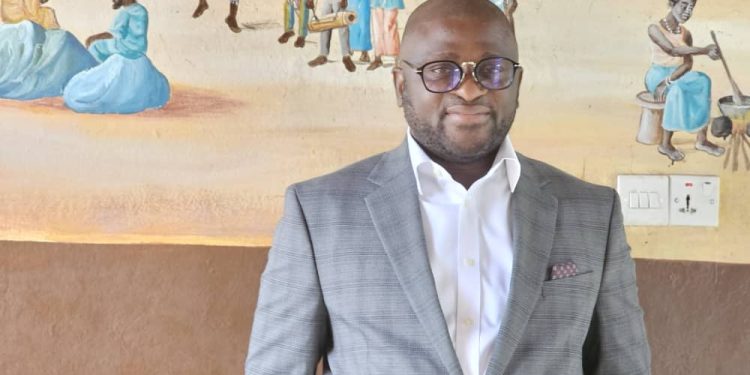Two football events have recently unfolded in Sierra Leone, and as an regulator, I noticed the significant impact football has on the daily lives of Sierra Leoneans. First, it was the FA Cup finals in Port Loko, and then the twin CAF Club competitions in Bo.
During these events, the local economies of the two cities enjoyed a sudden boost, even momentarily. Hotels were fully booked and spectators had to seek refuge in neighboring towns such as Kambia and Kenema, respectively. Food sellers ran out of stocks, and owners reported milked sales, making more profits by hiking prices.
Football is unmissable, unsurpassed, and an uninterrupted drama that takes you to places unimagined. Every game is pivotal to the livelihoods of young men, women, the elderly, and the aged. It is a trade and vocation for the youth, a market for the women’s sellables, a job for the coaches, referees, field carers, and tens of thousands of people across the country.
Football, known as soccer in some regions, holds a special place in the hearts of many Sierra Leoneans. The sport has become more than just a game; it has woven itself into the fabric of society, impacting various aspects of life in Sierra Leone.
In this article, I will attempt to chronicle the immense poltico-social and economic benefits that little rounded leather brings to our country.
Political Impact
In Salone, football has been used as a tool for political mobilization and national unity over the last decades. The national team, known as the Leone Stars, symbolizes national pride and identity. When the team last qualified for the Africa Nations Cup, people from all shades of life jumped into the streets to celebrate without borders. During times of political unrest or conflict, football has provided a temporary respite and a sense of unity among the people. Successive governments in the country have leveraged the popularity of football to promote national cohesion and distract citizens from political challenges.
Football also plays a role in diplomacy and international relations. Matches between Sierra Leone and other nations provide opportunities for cultural exchanges and diplomatic engagements. The diplomatic courtesies practiced are expected to be topnotch with reciprocity expected. Additionally, successful performances by the national team on the international stage has boosted the country’s image and reputation globally, a reason why our darling Leones Stars is expected to qualify for major competitions or win games.
Economic Impact
Football has significant economic implications in Sierra Leone. The sport creates employment opportunities for players, coaches, administrators, and support staff. The just concluded male and female Premier Leagues are estimated to have created around 3000 jobs, impressive returns for an investment just under USD 250,000. Local leagues and academies contribute to the development of talent and provide pathways for young individuals to pursue careers in football. Additionally, football matches and events generate revenue through ticket sales, merchandise sales, sponsorships, food by locals and broadcasting rights.
Football tourism has the potential to boost the country’s economy. International matches and tournaments attract visitors from around the world, leading to increased spending on accommodation, transportation, food, and souvenirs. Investments in sports infrastructure, such as stadiums and training facilities, also stimulate economic growth and development in the country. The recent FA Cup in Port Loko and CAF Competitions over the weekend in Bo are a case in point for local tourism.
Social Impact
Football serves as a unifying force in Sierra Leone, transcending social, cultural, and ethnic divides. Matches bring together people from different backgrounds to support a common cause and celebrate shared victories. The sport fosters a sense of community and solidarity among fans, creating a platform for social interaction and engagement.
Moreover, football plays a role in youth development and social integration. Many young Sierra Leoneans aspire to become professional footballers, using the sport as a means to escape poverty and achieve success. Football academies provide training and education to talented individuals, instilling values such as discipline, teamwork, and perseverance. Several of these academies include the Luawa, Kallon FC, Star Sports, to name but a few. Academies around the country provide a huge platform for children and youth across the country.
On a broader scale, football has the power to raise awareness about social issues, such the deadly Kush drug, and promote positive change. Players and clubs often engage in charitable activities, supporting initiatives related to education, health, and community development. Through their influence and reach, football personalities can advocate for important social causes and inspire others to make a difference.
Conclusion
It is therefore clear that, football holds immense political, economic, and social significance in Sierra Leone. As a national pastime and a source of pride, the sport plays a pivotal role in shaping the country’s identity and fostering unity among its people. While football faces challenges such as infrastructure limitations and financial constraints, its impact on Sierra Leonean society remains profound and enduring. By recognizing and harnessing the potential of football, Sierra Leone can continue to leverage the power of the beautiful game for the benefit of its people and communities. It’s time to invest in the game and impact other sectors.
Credit:Emmanuel Saffa Abdulai (PhD)
National Sports Authority













